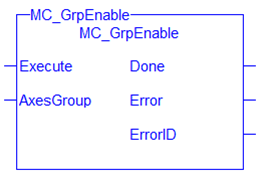![]()
![]()
 Function Block
Function Block![]() A function block groups an algorithm and a set of private data. It has inputs and outputs. - Changes the state of a group from GroupDisabled to GroupStandby.
A function block groups an algorithm and a set of private data. It has inputs and outputs. - Changes the state of a group from GroupDisabled to GroupStandby.
Inputs
|
Input |
Data Type |
Range |
Unit |
Default |
Description |
|---|---|---|---|---|---|
|
Execute |
BOOL |
0, 1 |
N/A |
No default |
On the rising edge |
|
AxesGroup |
N/A |
N/A |
No default |
The axis group to be enabled. |
Outputs
|
Output |
Data Type |
Range |
Unit |
Description |
|---|---|---|---|---|
|
Done |
BOOL |
N/A |
N/A |
If TRUE, the command completed successfully. |
|
Error |
BOOL |
N/A |
N/A |
If TRUE, an error has occurred. |
|
ErrorID |
INT |
N/A |
N/A |
Indicates the error if Error output is TRUE. See the table in PLCopen Function Block ErrorIDs. |
Remarks
-
- This function block starts a motion-related action and stores data for calculations and error checking.
See Call Function Blocks Multiple Times in the Same Cycle if using a dual-core controller.
- See Coordinated Motion, the top-level topic for Coordinated Motion.
- The group must be in GroupStandby to perform motion.
- If the group is already in GroupStandby, then MC_GrpEnable does nothing.
- MC_GrpEnable fails under these conditions:
- It contains no axes.
- The group is not in GroupDisabled or GroupStandby.
- One or more axes in the group are in another group that is not in GroupDisabled.
- See Group State Diagrams for more information.
Figure 6-119: MC_GrpEnable
FBD Language Example
FFLD Language Example
IL Language Example
BEGIN_IL "Instruction List"
This is a low-level language and resembles assembly
"Instruction List"
This is a low-level language and resembles assembly
CAL Inst_MC_GrpEnable( EnableGroup, Group1_Ref )
END_IL
ST Language Example
(* Inst_MC_GrpEnableST example *)
Inst_MC_GrpEnable( EnableGroup, Group1_Ref );
See Also









